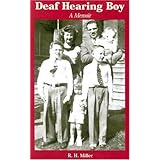
Average Reviews:

(More customer reviews)The second volume of the Deaf Lives series, Deaf Hearing Boy: A Memoir is the true story the author, born in 1938 as the oldest of four hearing boys to deaf parents. Deaf Hearing Boy chronicles growing up in changing times, and the author's own experience as the sometimes unwilling liaison between his deaf parents and hearing grandparents. The end of World War II brought poverty to the family, as returning soldiers displaced his parents' jobs and they had to resort to scraping by on the family farm. Deaf Hearing Boy chronicles an era when small farms gradually faded from the landscape, and cultural connectivity began to erode the isolation of deaf people. It tells of prejudice against the deaf, from fathers who would not let the author date their daughters for fear that the author carried a gene for deafness that would be passed on, to misunderstandings within the family and more. And it tells of a young man's abiding respect for his parents, despite the problems unique to a deaf couple striving to raise hearing children. A compelling testimony drawn directly from heart and memory.
Click Here to see more reviews about: Deaf Hearing Boy: A Memoir (Deaf Lives Series, Vol. 2)
Born in 1938, R. H. Miller was the oldest of four hearing boys with deaf parents in Defiance, Ohio, a small agricultural community. Deaf Hearing Boy is Miller's compelling account of the complex dynamics at work in his family, including the inter-generational conflicts in which he found himself, the oldest child of deaf adults (CODA), caught in the middle.In 1942, Miller's family moved to Toledo so that his father could find work. There, they fared well during World War II because his father worked in manufacturing as a member of Roosevelt's "civilian army." Miller's mother loved urban life, where she and the family could immerse themselves in the Toledo Deaf community, especially at the Toledo Silent Club. The end of the war marked the end of prosperity for the Miller family. Returning soldiers displaced all of the deaf workers, who then had to scrape for a living. The Millers, close to destitution, returned to the family farm in Defiance.Miller depicts the return to farm life as one of tremendous hardship, both economically and psychologically. They lived off the land from hand to mouth. He also describes his grandparents' distrust of his parents because they were deaf, and he writes candidly of his role as an unwilling agent in the misunderstandings between them. Miller also portrays the bias he endured in school and town. Parents of girlfriends would force their daughters to stop dating him for fear that his family's deafness would be passed down.In the early 1950s, Miller's grandparents sold the farm and his parents returned to industrial work. Miller excelled at school, and eventually left home for college and life in academia. His later reflections reveal a deep, abiding respect for his parents, despite his early difficulties. Deaf Hearing Boy presents an intimate depiction of a changing time for hearing and deaf Americans alike, when the family farm disappeared and the isolation of Deaf people also began to fade. In witnessing this transformation of society through his family's life, Miller adds an important chapter to the collective narrative of Deaf people, one made all the more poignant and vivid as told by their Deaf Hearing boy.
Click here for more information about Deaf Hearing Boy: A Memoir (Deaf Lives Series, Vol. 2)

No comments:
Post a Comment